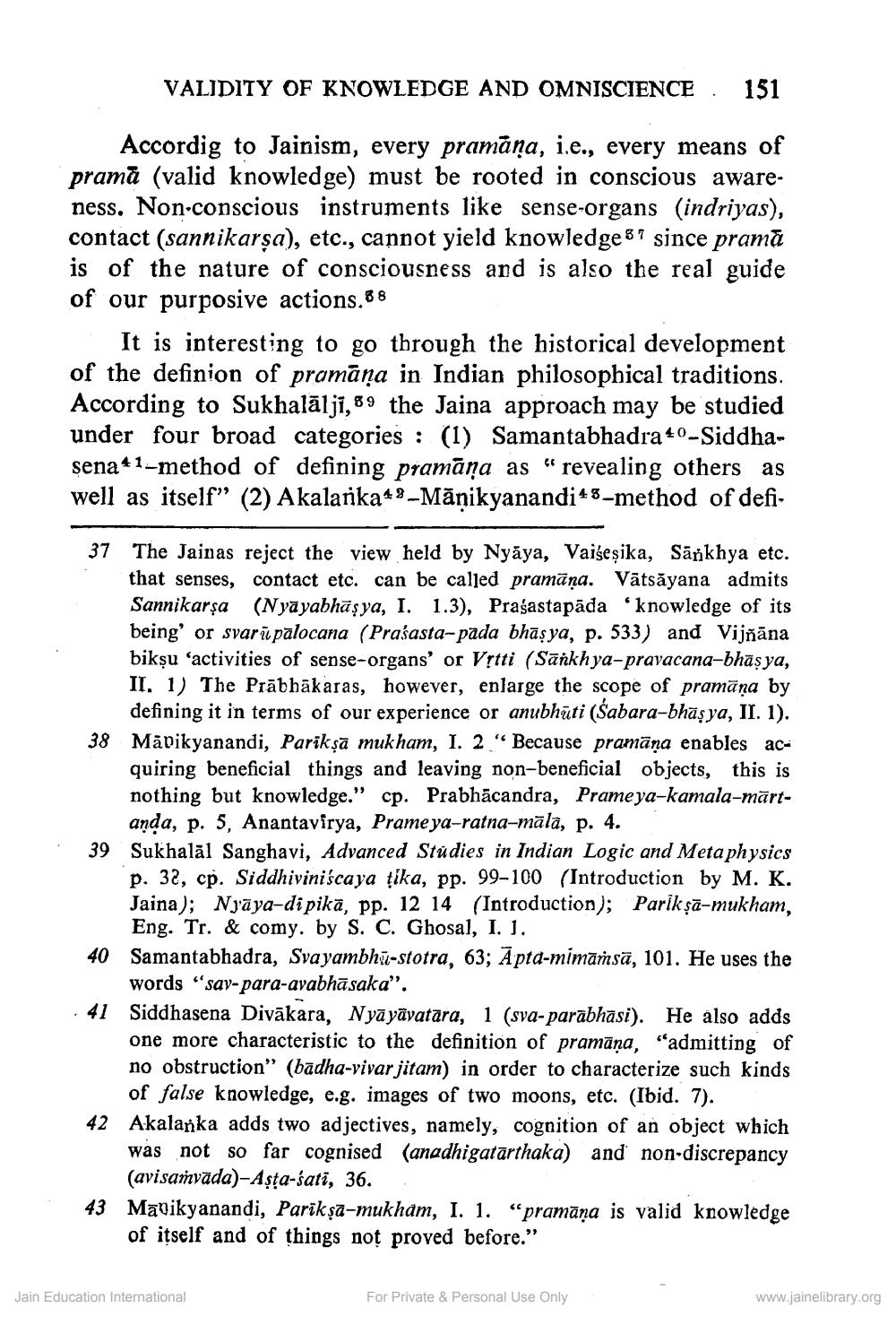________________
VALIDITY OF KNOWLEDGE AND OMNISCIENCE. 151
Accordig to Jainism, every pramāņa, i.e., every means of pramă (valid knowledge) must be rooted in conscious awareness. Non-conscious instruments like sense-organs (indriyas), contact (sannikarşa), etc., cannot yield knowledge 37 since prama is of the nature of consciousness and is also the real guide of our purposive actions.88
It is interesting to go through the historical development of the definion of pramāņa in Indian philosophical traditions. According to Sukhalālji,89 the Jaina approach may be studied under four broad categories : (1) Samantabhadra 40-Siddhasena1-method of defining pramāņa as "revealing others as well as itself” (2) Akalarika48 -Mānikyanandi 43-method of defi
37 The Jainas reject the view held by Nyaya, Vaiseșika, Sārkhya etc.
that senses, contact etc. can be called pramāna. Vātsăyana admits Sannikarşa (Nyāyabhāşya, I. 1.3), Prasastapāda 'knowledge of its being' or svarī palocana (Prasasta-pada bhāşya, p. 533) and Vijñāna bikṣu 'activities of sense-organs' or Vrtti (Sankhya-pravacana-bhāşya, II. 1) The Prābhākaras, however, enlarge the scope of pramāna by
defining it in terms of our experience or anubhūti (Sabara-bhāşya, II. 1). 38 Mäpikyanandi, Parikşā mukham, I. 2. "Because pramāna enables acquiring beneficial things and leaving non-beneficial objects, this is
hing but knowledge." cp. Prabhācandra, Prameya-kamala-mārtanda, p. 5, Anantavirya, Prame ya-ratna-mālā, p. 4. 39 Sukhalal Sanghavi, Advanced Studies in Indian Logic and Metaphysics
p. 32, cp. Siddhiviniscaya tika, pp. 99-100 (Introduction by M. K. Jaina); Nyāya-di pikā, pp. 12 14 (Introduction); Parikṣā-mukham,
Eng. Tr. & comy. by S. C. Ghosal, I. 1. 40 Samantabhadra, Svayambhū-stotra, 63; Āpta-mimāṁsā, 101. He uses the
words "sav-para-avabhāsaka". Siddhasena Divākara, Nyāyāvatara, 1 (sva-parabhasi). He also adds one more characteristic to the definition of pramāņa, "admitting of no obstruction" (badha-vivar jitam) in order to characterize such kinds
of false knowledge, e.g. images of two moons, etc. (Ibid. 7). 42 Akalanka adds two adjectives, namely, cognition of an object which
was not so far cognised (anadhigatarthaka) and non-discrepancy
(avisamvada)-Asta-sati, 36. 43 Māvikyanandi, Parikșa-mukham, I. 1. "pramāna is valid knowledge
of itself and of things not proved before."
. 41 Siddha
Jain Education International
For Private & Personal Use Only
www.jainelibrary.org




